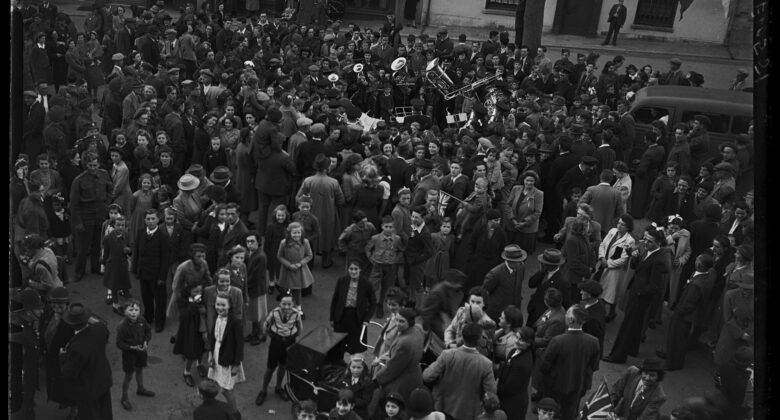VE Day Rightly celebrates the end of a truly awful European war and those who celebrated in May 1945 knew that they would no longer be bombed – the last V2 to land on British soil occurred on 29 March 1945. They hoped that soon their loved ones in prisoner of war camps would be home, that lights would be switched on at night and that Victory in Europe meant that Churchill’s ‘broad, sunlit uplands’ had a chance to germinate. There would be worry and loss too: there was still Japan and no victory in war could bring back those who had been killed.
So aside from the grainy images of celebrations in London, the dancing in the fountains, strangers kissing and scenes of wild celebration what of our battalions? The archive is surprisingly light on detail regarding the thoughts of those serving, at least within individual diaries, but what of the War Diaries of the Battalions?
The 2nd Battalion diary is short and to the point – the entry for 7 May reads ‘VE Day announced as 8 May.’ On the actual day itself, ‘No training and short Thanksgiving Service held.’ Finally on 9 May, it is difficult to read but, ‘The whole Bn was entertained by 2nd Bedf & Herts as part of celebrations.’ It is difficult to discern much from these brief comments but it seems that 8 May was treated as a rest day with a moment of quiet reflection in a Thanksgiving Service. The celebrations, the official ones at least, took place on the following day, 9 May.

No one within the 2nd Battalion could guess that it would remain in Greece for another three years. As Major Hugo White reflected, ‘when the European War was over, it still engaged in counter-terrorist operations in the Greek hinterland. The 2nd Battalion had been the first DCLI soldiers to see action in the Second World War, and was now to be the last to depart from the fields of conflict.’1
The 5th Battalion were stationed at Badenstedt, Germany on 7 May 1945 and had even less detail of VE Day than that of the 2nd Battalion. In fact several pages were allocated to 7-8 May and the primary impression is one of professionalism and purpose in dealing with occupation of a defeated country. The only mention of VE day occurs late on 8 May, after 18:30 with the following notation:

There must have been some celebration within the 5th Battalion, although you would be hard pressed to find any detail of it in the War Diary. Perhaps the scarcity of celebration is explained by the fact that fighting had ended for the British Army on 5 May, as recorded by the War Diary during the evening of 4 May 1945:
During the evening the news was broadcast which meant the end of the war in our sector: that at 0800 hrs tomorrow, 5 May 1945 would sound the “Cease Fire” in NW Germany, Holland and Denmark. Many ORs of the Bn were in the mobile cinema at Bde HQ when the operator stopped the film to announce “the war is finished”, followed by the brief details of the time and areas affected, although many minutes of cheering and stamping, mutual shaking of hands and throwing of caps held up the announcement of details for a long time. Released British merchant seamen who had spent up to 4½ years in German prisons, until being set free from WESTERTIMKE, were especially jubilant at the announcement.
As the news spread, scenes of 2great enthusiasm took place. Searchlights weaved all over the sky and earth, machine guns fired bursts of tracer into the night sky, Verey lights shot up all over the place and all the old sentimental songs rang forth.
As we were out of action at the time we could give full vent to our relief at the long-awaited end of hostilities with Germany.
The 30th Battalion throughout its existence acted as a static defence Battalion against the threat of invasion, guarded prisoners and had a regular turnover of staff as the younger fitter men were constantly posted to other units. On 16 August 1943, the Battalion sailed from Glasgow for the Middle East to carry out yet more guard duties in various locations from Algeria to Sudan.
On 8 May the Battalion was stationed in Sudan, guarding Italian prisoners of war and maintaining order as part of Middle Eastern Command. A detachment was based in Khartoum and according to the unofficial War Diary of the 30th Battalion, VE Day ‘was celebrated in fine style with a swimming gala attended by the Kaid and the Area Commander’, and ‘On the Sunday following VE Day the troops in the Area paraded for a March past to the Kaid… followed by a Thanksgiving Service in the Cathedral’.
As Sir Hugo White states its role, ‘was absolutely vital to the outcome of the war; for six years it [had] carried out the hard grind of its mundane duties, always well out of the limelight and often in some of the most desolate spots in the world.’
- Hugo White, One and All A History of the Duke of Cornwall’s Light Infantry 1702-1959, Tabb House, 2006, p. 372. ↩︎
- The National Archives, WO171-5180, pp. 13-14. ↩︎
Photo credit: George Ellis Collection GE-2-3-E-10551 , Kresen Kernow

